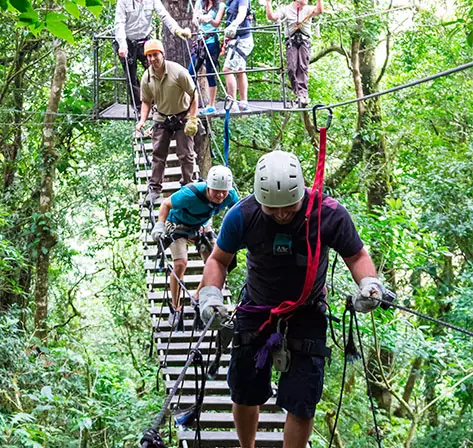Costa Rica has gained a reputation for being a leader in sustainable tourism. With over 25% of its land designated as protected areas, it’s no surprise that eco-tourism has become a significant part of the country’s tourism industry. But sustainable tourism in Costa Rica isn’t just about protecting the environment; it’s about creating opportunities for local communities and preserving the country’s rich cultural heritage. In this article, we’ll explore why sustainability and adventure make for the perfect mix for your Costa Rican vacation.

What is Sustainable Tourism?
Sustainable tourism is a type of tourism that focuses on minimizing the negative impacts of tourism on the environment, culture, and economy. Sustainable tourism in Costa Rica is based on the principles of conservation, community involvement, and economic sustainability. The country’s protected areas and eco-lodges are prime examples of sustainable tourism in action.
Adventure Tourism in Costa Rica
Costa Rica is a haven for adventure seekers. The country is home to a wide range of activities, including ziplining, white-water rafting, surfing, hiking, and much more. These activities not only provide an adrenaline rush but also offer opportunities to connect with nature and local communities. Many adventure tour operators in Costa Rica are committed to sustainable tourism practices, ensuring that their activities have minimal impact on the environment and provide economic benefits to local communities.
Eco-Lodges and Sustainable Accommodations
Staying at an eco-lodge or other sustainable accommodation is a great way to support sustainable tourism in Costa Rica. These lodges are designed to minimize their impact on the environment while providing a unique and comfortable stay for guests. Many eco-lodges are located in or near protected areas, providing guests with easy access to hiking trails, wildlife watching, and other outdoor activities.
Conservation and Wildlife Protection
Costa Rica is home to an incredible array of wildlife, including monkeys, sloths, toucans, and jaguars. Conservation and wildlife protection are central to sustainable tourism in Costa Rica. The country’s national parks and wildlife reserves are protected areas where visitors can learn about conservation efforts and see these animals in their natural habitats. Many eco-tourism operators also work with local communities to promote conservation and wildlife protection.
Supporting Local Communities
Sustainable tourism in Costa Rica is also about supporting local communities. Many eco-tourism operators work with local communities to provide economic opportunities through tourism. Visitors can support these communities by buying locally-made crafts and souvenirs, dining at local restaurants, and staying at locally-owned accommodations. By supporting local communities, visitors can help ensure that tourism benefits everyone, not just a few.
Cultural Heritage and Education
Finally, sustainable tourism in Costa Rica is about preserving the country’s rich cultural heritage. Many eco-tourism operators offer tours and experiences that provide visitors with a deeper understanding of Costa Rican culture and history. For example, visitors can take cooking classes, visit indigenous communities, and learn about the country’s history through museums and historic sites. Sustainable tourism in Costa Rica can help preserve the country’s unique identity and promote understanding between different cultures by promoting cultural heritage and education.
In conclusion, sustainability and adventure are the perfect mix for your Costa Rican vacation. Sustainable tourism in Costa Rica is about protecting the environment, supporting local communities, promoting cultural heritage, and providing opportunities for adventure and outdoor activities. By choosing eco-friendly accommodations and activities, visitors can ensure that their vacation has a positive impact on the environment and local communities. Book your sustainable adventure in Costa Rica today and experience the beauty of this tropical paradise while supporting sustainable tourism practices.

